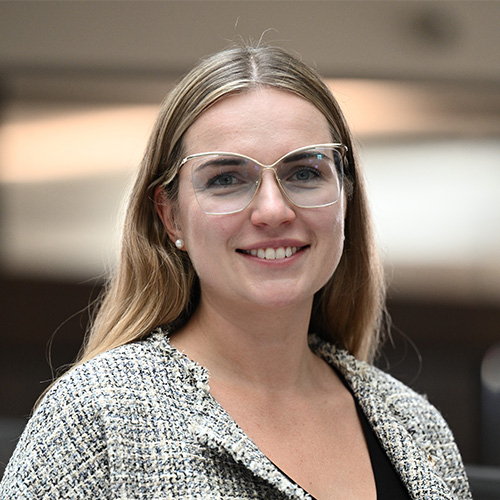As avid researchers and practitioners with decades of energy sector experience, Johns Hopkins professors bring their real-world research and cutting-edge use cases to the classroom. The Johns Hopkins SAIS faculty includes award-winning authors, researchers and leaders in areas such as management consulting, global energy, as well as a full range of other disciplines within sustainable energy.
They are also members and leaders within organizations such as Energy Security and Climate Initiative and Initiative for Sustainable Energy Policy (ISEP).

Johannes Urpelainen
Prince Sultan bin Abdulaziz Professor of Energy and EnvironmentJohannes Urpelainen is the Prince Sultan bin Abdulaziz Professor of Energy, Resources and Environment at Johns Hopkins SAIS and the Founding Director of the Initiative for Sustainable Energy Policy (ISEP). He received his PhD in Political Science from the University of Michigan in 2009 and spent the next eight years at Columbia University. Johannes is the award-winning author of four books and over a hundred refereed articles on environmental politics, energy policy, and global governance. He teaches action-oriented classes on energy and environmental policy to equip the next generation of global leaders with deep knowledge, advanced analytical skills — and a passion for transformational social change. As one of the world’s top energy policy experts, Johannes frequently advises governments, international organizations, and the private sector on energy and environment. As the Founding Director of ISEP, Johannes is responsible for the vision, strategy, and general management of the initiative. His work under ISEP offers pragmatic but effective approaches to providing the world’s population with affordable and abundant energy at minimal environmental impact. In his spare time, Johannes reads biographies and tries to improve his Hindi.
Read more...
John Banks
Senior Lecturer, Faculty Co-Lead, Development, Climate, and Sustainability Focus AreaJohn P. Banks is a Senior Lecturer at the Johns Hopkins University School of Advanced International Studies (SAIS).
Banks has over 30 years of experience in the energy industry, specifically in consulting, academia, and at a leading think tank. Since 2009 he has been affiliated with SAIS, first as an adjunct professor and then becoming a full-time faculty member in 2016. He currently serves as faculty co-lead of the Development, Climate and Sustainability focus area within the two-year Master of Arts in International Relations (MAIR) degree program.Prof. Banks teaches Global Electricity Markets, Energy Transitions in the US, and leads the Energy and Environment Practicum, an innovative course in which second-year MAIR students work with external client organizations on projects addressing environmental and energy policy challenges. Banks also designed and teaches the first course in the new Master of Arts in Sustainable Energy online degree program at SAIS, launched in Fall 2020.
Banks recently oversaw two student research field projects: examining electricity access challenges in Myanmar, and assessing the city of Seoul, South Korea’s efforts at deploying clean energy, especially solar PV. Professor Banks was selected by the student body to receive the 2019 Excellence in Teaching Award.
His research focuses on the ongoing transformation of the global electricity sector, with a particular interest in the intersection of technology innovation, policy, and regulatory trends as they impact de-carbonization approaches and evolving business models. In 2019, he published a co-authored assessment of alternative, sub-national electricity service models in the U.S., specifically community choice aggregation, the sustainable energy utility, and municipal utilities. In another peer-reviewed, research overview article (2022) he assessed how different types of electricity markets in the U.S are impacted by variable renewable resources and distributed energy resources, and how these markets are adapting and innovating to accommodate these resources.
For nine years (2009-2018), Banks served as a Nonresident Senior Fellow in the Energy Security and Climate Initiative at the Brookings Institution. He contributed to the formation of, and helped run, Brookings’ Global Electricity and Technology Roundtable, a bi-annual, private meeting of senior utility and technology industry executives, state and federal government officials, financial institutions, regulators, academia, and others designed to discuss major developments in the electricity sector globally. While at Brookings, he played a leading role in developing and carrying out research efforts dealing with nuclear power, the transition of the electricity sector in Germany and Japan, the role of distributed energy resources in the US, electricity access in emerging markets, and the future role of coal.
Prior to working at a think tank and in academia, Banks was a consultant for over 20 years, advising governments, companies, and regulators throughout the world on energy policy, security, and governance issues. He has worked for a number of firms, including Nexant, Inc. the successor company to Bechtel Technology & Consulting, and BearingPoint (now Deloitte) in New York.
Banks has authored or co-authored dozens of energy reports, published numerous articles, and provided expert testimony. He has worked in more than 30 countries outside the U.S., and holds an MS in Foreign Service from Georgetown University.
Read more...
Anna Broughel
Lecturer in Sustainable Energy Transition PolicyAnna is a lecturer in Sustainable Energy Transition Policy and a faculty co-lead of the focus area on Technology and Innovations at Johns Hopkins University School of Advanced International Studies (SAIS).
She previously served as the director at the Clean Energy Leadership Institute (CELI), energy economist and statistician at Tetra Tech, and an ORISE Fellow at the Solar Energy Technologies Office (SETO) at the U.S. Department of Energy. As a member of the executive council of the United States Association for Energy Economics (USAEE), Anna holds the position of Vice President of Communications at the USAEE and oversees the USAEE annual conference plenaries. She holds BAs in Economics and Linguistics, an MA in International Economics, and a Ph.D. in Economics, Policy, and Human Dimensions, which she received as part of her Fulbright studies. She completed post-doctoral training at the University of St. Gallen and at the University of Maryland College Park.
Read more...
Jonas Nahm
Associate ProfessorJonas Nahm is an Associate Professor at the Johns Hopkins School of Advanced International Studies. Jonas' research interests focus on the intersection of economic and industrial policy, energy policy, and environmental politics. In particular, he studies the role of the state in processes of industrial restructuring that accompany responses to climate change and clean energy transitions more broadly. His work utilizes clean energy transitions in China, Germany, and the United States to engage two debates in comparative political economy: (1) the role of the state in shaping the international division of labor in highly globalized industries, and (2) sources of state capacity in interest group politics during periods of industrial restructuring. His book manuscript, “Collaborative Advantage: Forging Green Industries in the New Global Economy”, uses the development of renewable energy sectors to investigate the political economy of innovation and industrial development in highly globalized industries. The book shows that new possibilities for collaboration among firms in the global economy have reinforced national patterns of industrial specialization. In the decades before international economic integration made it easier for firms from around the world to work together on tasks ranging from production to innovation, differences in national capitalisms yielded equally distinct national industrial specializations for production, innovation, and competitiveness. Globalization has since challenged the primacy of nation states by moving beyond their territorial reach many of the activities that now make up the global economy. However, as Jonas shows in the book, globalization not only continues to be mediated by domestic institutions, it also causes persistent and consequential divergence of such institutions and national industrial specializations over time. In addition to his work on renewable energy industries, Jonas has ongoing research projects on the politics of greening the global auto sector and the subnational determinants of climate policies. His research has been funded by the Minerva Research Initiative and the U.S. Army Research Office, the German National Academic Foundation, the World Bank Institute and the Korean Development Institute, the Horowitz Foundation for Social Policy, the Harvard Center for European Studies, the MIT Center for International Studies, and the Caroll Wilson Foundation. He was an MIT Energy Fellow and a Fellow of the German National Academic Foundation. Prior to coming to Johns Hopkins SAIS, Jonas was a Postdoctoral Fellow at the Watson Institute for International and Public Affairs at Brown University. He holds a PhD in Political Science from MIT and speaks German and Mandarin Chinese.
Read more...
Goksenin Ozturkeri
Chief Investment Officer at Elevate PowerGoksenin Ozturkeri is the Chief Investment Officer at Elevate Power, the premier hydro-centric 24/7 renewable energy owner and operator based in New York. In this role, he is responsible for developing and executing Elevate Power’s investment and capital raising strategy.
In addition to his role at Johns Hopkins SAIS, Goksenin is also an Adjunct Professor at Columbia University School of International and Public Affairs, where he teaches a master's-level course on renewable energy project finance and modeling.
Goksenin is a scuba diving instructor, explorer, and conservationist. He has introduced hundreds of students to the underwater world through PADI and SSI since 2021. He is actively working with organizations like The Explorers Club and Blue Endeavors to protect our marine ecosystems towards a sustainable future.
He received his master's degree in Energy & Environment from Columbia University and dual bachelor’s in Chinese Studies and International Affairs from Istanbul Okan University as a Valedictorian. He received his CFA charter in 2021 and Advanced Financial Modeler certification in 2019. As a first-generation immigrant in the US, Goksenin is fluent in Turkish and English and conversational in Chinese and Spanish.
Read more...Request Information
To learn more about the MA in Sustainable Energy (online) and download a brochure, fill out the fields below, or call +1 443-565-4632 to talk with one of our enrollment specialist.
